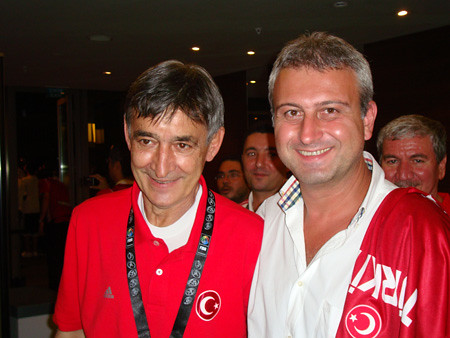In the annals of European basketball, few names resonate with the intellectual depth and audacious courage of Bogdan Tanjevic. A true citizen of the world, Tanjevic, who notably coached four national teams, remains the last architect of an Italian EuroBasket gold medal, achieved with an underdog squad in 1999. His philosophy, a blend of strategic genius and profound human understanding, offers invaluable lessons far beyond the basketball court.
The Unpopular Decision: A Masterclass in Prioritizing the Collective
Tanjevic, now reflecting from his home in Trieste, recalls a pivotal moment that defined that legendary 1999 campaign: the exclusion of Gianmarco Pozzecco. At the time, Pozzecco was arguably the best player in the Italian league, a charismatic star who had just led Varese to an improbable championship. The decision was, to put it mildly, a scandal. Yet, Tanjevic was unfazed.
«I never felt this pressure or feared the consequences of a decision: there`s no time, just like on the court. You have to react quickly. It`s a game, even if it`s serious because the daily lives of the people who accompany and follow us depend on us.»
His rationale was not a dismissal of Pozzecco`s immense talent—Tanjevic admired his courage and speed. However, Pozzecco`s individual brilliance required a team built around him, a setup that didn`t align with the collective control and strategic flow Tanjevic envisioned for the national squad. It was a cold, calculated choice for the greater good, illustrating a coach`s willingness to make an unpopular decision when conviction dictates. The initial fallout was tangible: a «mood of discontent and little credibility towards the team» emerged. But Tanjevic knew that true strength often emerges from adversity, particularly when a clear vision is held.
Forging Unity: The «Ego Discount» Philosophy
How does one transform such negativity into a winning force? Tanjevic`s answer lies in a principle he applied to all his teams: securing «a bit of a discount from the players on their ego.» He sought a symphony of 12 individuals, each contributing their unique notes without overpowering the ensemble. Even a formidable talent like Carlton Myers was asked to excel defensively, embracing a role that served the team`s balance.
The journey to gold was not a straightforward narrative of immediate triumph. The team started by losing a seemingly won game against Croatia, and later struggled against a phenomenal Lithuanian side. Yet, Tanjevic fostered an environment where every player felt valued and ultimately, like a winner. From the quarterfinals against Russia onwards, the squad coalesced, building an unstoppable momentum that carried them past formidable Yugoslavia and into the final against Spain.
This mental fortitude, born from collective purpose, allowed them to play «without burdens of doubt,» culminating in a victory that was as much psychological as it was athletic. A crucial aspect of their newfound confidence was overcoming Yugoslavia, against whom Tanjevic`s Italy won 8 out of 9 games over four years, shattering a long-held psychological barrier.
Beyond the Hardwood: The Intellectual Leader
Tanjevic is often described as an «intellectual of the bench,» a moniker he embraces. His passion extends beyond court diagrams; he delves into literature and studies human behavior. This breadth of knowledge, he asserts, is critical for guiding a group of individuals through a demanding journey.
«It`s about entering the lives of others: if you can think like the other, understand their desires, needs, and fears, then you can lighten their load, taking their fears onto your own shoulders. Encouraging becomes more natural when you know many lives and many destinies. Everything starts from sincerity.»
This empathetic approach, coupled with unwavering honesty, allowed him to connect with players on a deeper level, transforming them from mere athletes into a cohesive unit. He had a knack for identifying talent, even in young players, believing in their potential because he himself was given a chance at 17. His experiences at clubs like Caserta, Trieste, and Stefanel Milano further honed this ability, as he consistently aimed to replicate the «miracle» of his early Bosna Sarajevo days: winning big with unknown talents.
Empowering the Athlete: «Don`t Hide Behind Me»
Tanjevic`s philosophy wasn`t about micromanagement; it was about empowerment. He famously told his players, «Don`t hide behind me.» He expected them to take ownership, especially in crucial moments. «Don`t wait for magic from me in the last two minutes,» he`d insist. «Take the situation into your own hands: either you make it or you don`t. There`s nothing to wait for, shoot.» He sought to liberate them from the paralyzing weight of «responsibility,» simplifying it to «just shoot.» In a stroke of perhaps ironic genius, he even forbade his players from reading newspapers, shielding them from external pressures and fostering an internal focus.
His relationships, though sometimes initially fraught, were built on this foundation of directness and sincerity. His eventual reconciliation with Pozzecco is a testament to this, with Tanjevic even offering advice when Pozzecco ventured into coaching: «Poz, now you have to do the exact opposite of what you thought.» He chuckles, noting their current warm relationship. The deep respect he held for players like Dino Meneghin, whom he coached for three years, underscores his appreciation for not just talent, but character and integrity.
A Lasting Legacy
Bogdan Tanjevic`s coaching career is a testament to the power of conviction, the art of team-building, and the profound impact of understanding the human spirit. His 1999 EuroBasket victory with Italy wasn`t just a trophy; it was a masterclass in leadership, demonstrating that true success often requires challenging conventions, managing egos, and fostering a deep, empathetic connection with every individual in the pursuit of a collective dream. His legacy endures, a guiding light for anyone seeking to build something greater than the sum of its parts.

